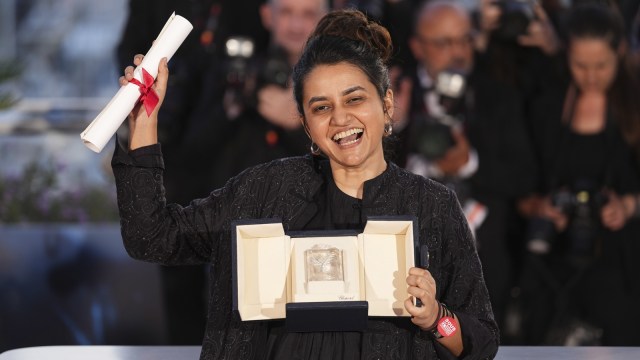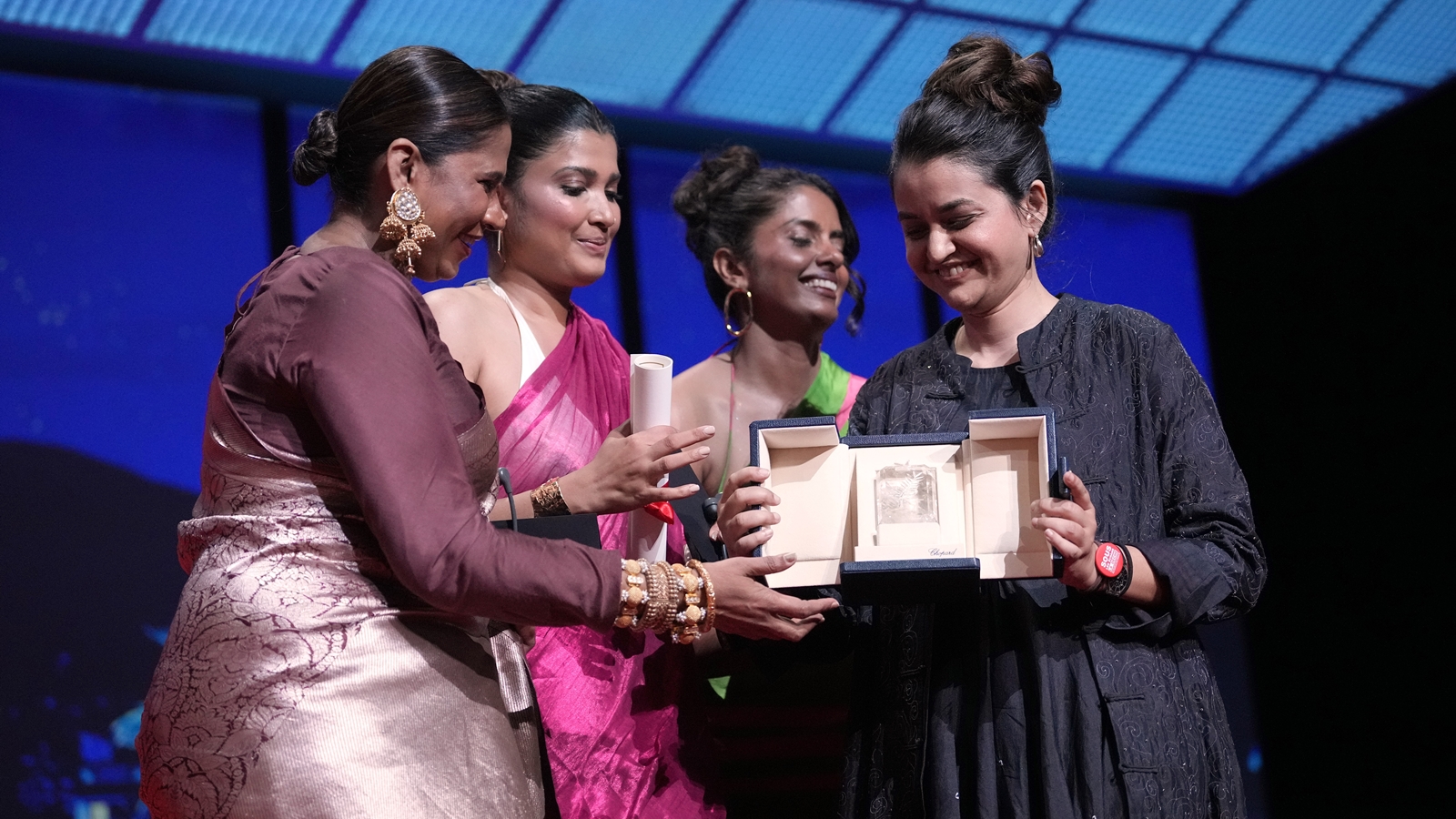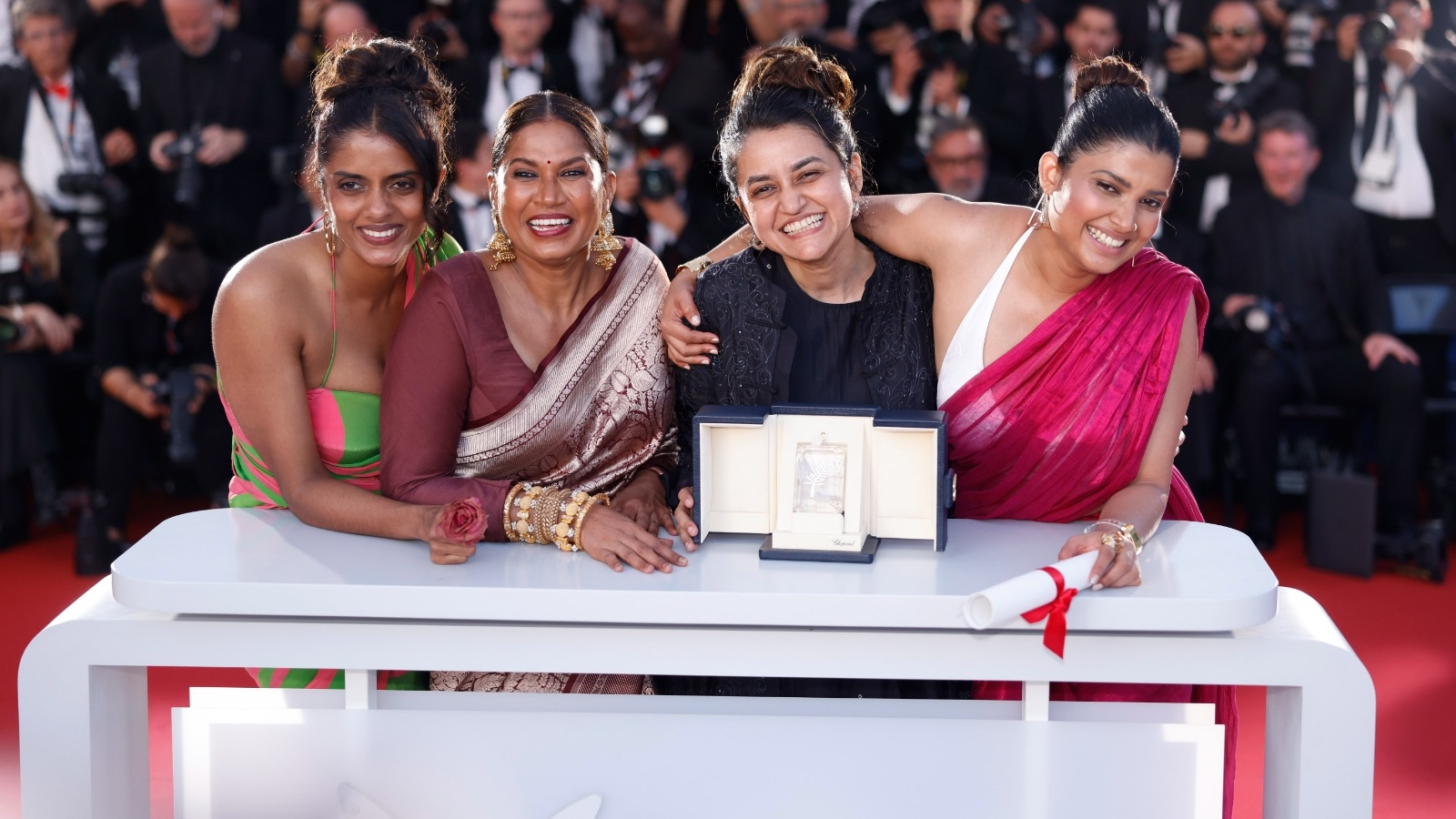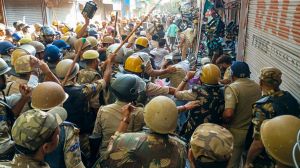Click here to follow Screen Digital on YouTube and stay updated with the latest from the world of cinema.
From run-ins at FTII to the Grand Prix at Cannes: The long journey of Payal Kapadia
“We are celebrating and planning to invite her for the screening of the film on the campus once she returns," said Atharv Karvekar, a member of of FTII Students’ Body.
 Payal Kapadia after the Cannes award ceremony. (AP)
Payal Kapadia after the Cannes award ceremony. (AP)The buzz at the sleepy campus of the Film and Television Institute of India (FTII) in Pune hasn’t died down ever since its alumna Payal Kapadia won the Grand Prix at the Cannes Film Festival for her film All We Imagine as Light on Saturday. Her films are being screened on campus and conversations steer invariably to her work.
“The feeling is of course great. Students here have rejoiced the big win of Payal’s film at Cannes. It’s an enormous win not just for them but for the FTII student community too in someway,” said Barsha Dasgupta, a cinematography student.
“We are celebrating and planning to invite her for the screening of the film on the campus once she returns,” said Atharv Karvekar, a member of of FTII Students’ Body.
Express At Cannes: Payal Kapadia’s All We Imagine As Light is a meditative soliloquy on loneliness and connection
The institute is thrilled at the unprecedented wins by its alumni and students – Chidananda Naik’s Sunflowers Were The First Ones To Know winning the La Cinef Award for best short film and Maisam Ali’s ‘In Retreat’ screened at the ACID side bar programme at Cannes.
 All We Imagine As Light wins big at Cannes 2024. (Photo: AP)
All We Imagine As Light wins big at Cannes 2024. (Photo: AP)
“It’s a moment of pride for FTII as its alumni create history at Cannes… FTII cherishes the glorious achievements of its alumni at this mega international stage of cinema,” FTII posted on X.
In his post on X, R Madhavan, the present chairman of FTII’s Governing Council wrote, “Big Big Congratulations to all the winners from India at Cannes… Spectacular year for India and so much to Cheer about especially the big WIN by the students of FTII.”
Cinematographer Mayank Khurana, Kapadia’s batchmate who shot her short film Afternoon Clouds (2017), remembers his association with her. “Filmmaking in itself is a very emotional process and Payal is a very emotional filmmaker. The stories she tells are about love and empathy and friendship. They drain you emotionally too. At the same time, being part of the protests was also an emotionally draining experience. It was a duty call from both sides: a passion project of a film and a fight for the FTII community, the institute, the country. So there were times when we kept our film project on the back burner. But it was a part of the curriculum, so we did complete it and then it went to Cannes.”
View this post on Instagram
Khurana, who hails from Jhansi and has worked on multiple projects with Kapadia said, “Payal and I bonded very well as our stories were rooted and inspired with family. There is this indulgence, the time she spends with the crew and makes them her family. It doesn’t feel like you are just working with the director. We spent months and months together, not just discussing films, but discussing life and going to rehearsals and there was an infinite amount of preparations that she puts in, and helps the crew. It feels like a collaboration. It shows when other people work with her, that she brings out the best in her.”
Afternoon Clouds was shot in the midst of the students’ protest of 2015 against the contentious appointment of TV actor Gajendra Chauhan as the Governing Council chairman of FTII. The protests lasted for 139 days and received national attention but were also followed by a crackdown by the administration.
 All We Imagine as Light director Payal Kapadia (second from right) with (from left) actors Kani Kusruti, Chhaya Kadam and Divya Prabha. (Image: AP)
All We Imagine as Light director Payal Kapadia (second from right) with (from left) actors Kani Kusruti, Chhaya Kadam and Divya Prabha. (Image: AP)
The excitement and oppression of this period is captured in A Night Of Knowing Nothing made in 2021. Himanshu Prajapati, also an FTII alumni and co-writer for the documentary, recalls just how difficult it was to make the film. “We had a lot of material from the interviews that were shot during the protests. When we sat down to discuss the structure, it felt impossible to show all the interviews. So we decided to build characters who would portray the accumulation of all the feelings that students were going through.”
A Night Of Knowing Nothing was screened at Cannes too. “The strike became a painful memory for us. Even when we were writing and making the film, we didn’t want to relive that time. But when it all came together and it was screened, that felt like a healing experience, at least for me,” Prajapati said.
Foreign exchange programme, scholarship withheld
In December 2016, Kapadia — then a final year film direction student — was among six students who qualified for the institute’s foreign exchange programme. She was also among eight students who had qualified to receive a scholarship — a sum of Rs 22,000 — given by private donors to students who top their class.
Kapadia, however, couldn’t avail of both these opportunities. The institute administration – headed by then director Bhupendra Kainthola – “disqualified” her and several other students owing to “disciplinary issues” and especially due to their alleged involvement in the August 2015 incident of “forcible prolonged detention” of the the then institute director Prashant Pathrabe, in the midst of the students’ strike at the institute in 2015, to protest against Chauhan’s appointment.
Kapadia is among 35 students who were named by Pune Police in a complaint registered by Pathrabe for his alleged forcible detention in his office by a group of 50 students. The case which is being heard at Pune magistrate is still pending. “We have to go to the Pune court once in a while for a hearing. Last time we went was a few months ago,” said a student who is among the 35 students charge-sheeted by Pune Police in March 2016.
Soon after the students’ strike ended in November 2015, FTII had created an office of proctor and all the files pertaining to scholarships and foreign exchange were routed through here. “The purpose was to punish students who were part of the protest. Several students were denied scholarships and foreign exchange programmes as if they were convicted for these crimes. Eight years on, the case is still pending at the court,” said the student.
Kainthola had defended these actions, telling The Indian Express the denial of these benefits was according to existent rules. “It is our belief that an academically bright student must also learn to function within the framework of institutional rules and good behaviour. The two can not be disjointed,” he told The Express in January 2017.
The case
In mid-August 2016, two months into the student’s strike, the administration had announced assessment of the 2008 batch’s final projects on an “as is where is” basis. The protesting students saw this as a move to oust the 2008 batch students, many of whom were at the forefront of the agitation, from the campus and not letting them finish their diploma projects, which are important for students to get work once outside the institute.
As the assessment commenced, a group of students met Pathrabhe in his cabin asking him to withdraw the decision. A heated discussion ensued, with more students entering the office. By that evening, the students had squatted in his office as well as in the lobby, effectively blocking his exit. As the situation worsened, the FTII security officer called in police who tried to remove the director forcefully, which led to a chaotic situation and damage to office property.
The next day the FTII director filed a police complaint against 50 students naming 17 of them. Later, 18 more names were identified and added to the list. They were booked under various sections of the Indian Penal Code and Prevention of Damage to Public Property Act.
Three days later, police swooped down on the campus arresting seven of the students named by the director. They were later released on bail and other students — including Kapadia — got anticipatory bail.
By the folliwing year, however, FTII softened the stand against Kapadia when her ilm Afternoon Clouds was sent for Cinefoundation section at Cannes, a section devoted to film schools, and was selected.
Kapadia steadily climbed the ladder of success with every subsequent project at FTII. Her first-year project Watermelon, Fish and Half Ghost made in 2013 combines live action with animation. Her 23-minute film And What Is The Summer Saying made with three of her batchmates, was screened at Berlin International Film Festival (Berlinale) in 2018.






- 01
- 02
- 03
- 04
- 05




























